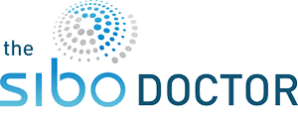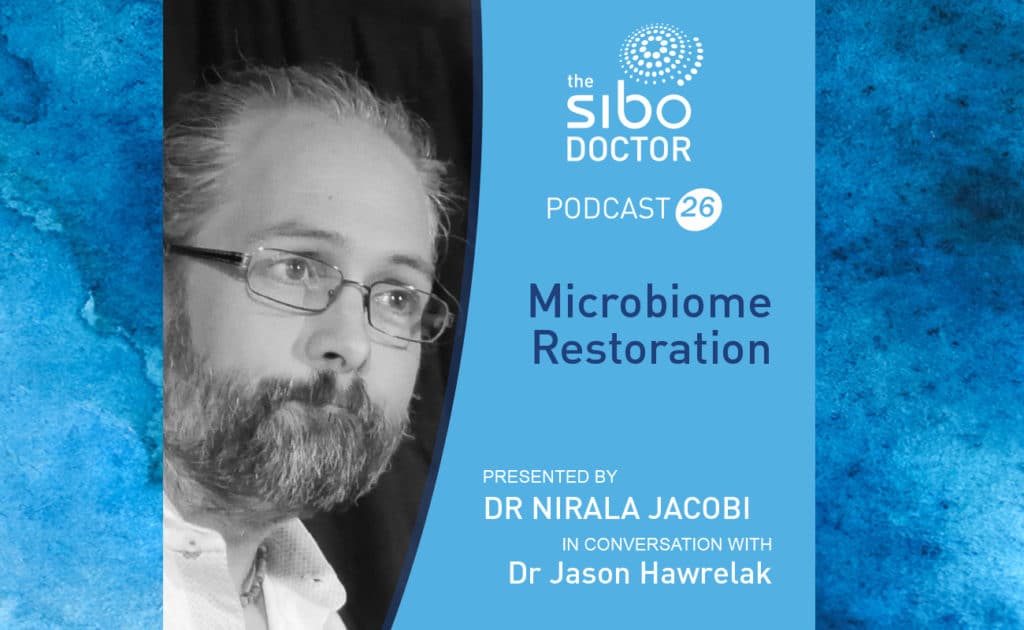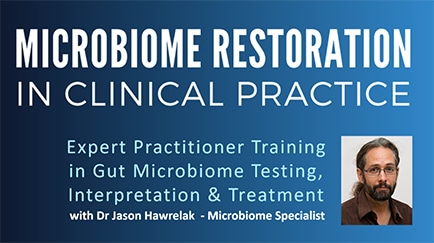In today’s episode, Dr Nirala Jacobi welcomes back Dr Jason Hawrelak, to talk about Microbiome Restoration.
Dr Hawrelak is a researcher, educator, naturopath, and nutritionist with over 16 years of clinical experience. He also practices at Gould’s Natural Medicine – a 135-year-old natural medicine apothecary and clinic in Hobart, Tasmania, Australia.
Dr Hawrelak completed his PhD examining the capacity of probiotics, prebiotics, and herbal medicines to modify the gastrointestinal tract microbiota. He is the senior lecturer in Complementary and Alternative Medicines at the University of Tasmania’s School of Medicine where he coordinates the evidence-based complementary medicines programs.
Dr Hawrelak also teaches the gastrointestinal imbalances unit, within the Masters of Science and Human Nutrition, and Functional Medicine Program at the University of Western States, in Portland, Oregon.
Listen to the Episode
Topics discussed include:
- The SIBO Doctor courses
- Regrowing vs killing in the microbiome.
- Colonic collateral when we are dealing with SIBO, and the necessity to restore the colonic ecosystem as part of the SIBO treatment.
- How do we learn to interpret the DNA readings and PCR reports?
- The SIBO Doctor Microbiome Restoration course
- A discussion of the modules offered in the Microbiome Restoration course
- Module 1 – Testing
- The difference between different labs
- Culturing vs DNA techniques
- Assessment, Interpretation, and Diagnosis
- Module 2 – Beneficial Bacteria, including
- Akkermansia
- Faecalibacterium prausnitzii
- Butyrate-producing microbes
- Hydrogen sulfide gas producers
- Module 3 – Pathobionts
- The good, the bad, the ugly
- Hydrogen sulfide producers
- Methanobrevibacter smithii
- coli
- Bacteroides
- Triple antibiotic therapy (for conditions such as H. Pylori and Blastocystis Hominis) and the impact on the colonic ecosystem balance of symbionts and pathobionts.
- Dietary changes vs probiotic supplements to elicit change in the gut microbiome.
- The complications between advising prebiotic nutrition for optimising microbiome restoration, whilst clients are on therapeutic diets such as the Low FODMAP diet – how to reconcile?
- Hydrogen sulfide breath testing – coming soon.
- High-fat content diets in SIBO, and how this can eventually feed hydrogen sulfide producing bacteria.
- Symptoms such as food reactivity and visceral sensitivity as a consequence of dietary choices in SIBO treatment, in regards to hydrogen sulfide producing bacterial blooms.
- The therapeutic benefits of Soy Isoflavones in relation to Methane and Hydrogen Sulfide producing SIBO patients.
- Equol producers – patients who have bacteria that convert soy isoflavones into the bioactive component, Equol.
- Adlercreutzia levels in people who eat soy products as a long-term dietary choice.
- Is there a connection between histamine intolerance, salicylate intolerance, and oxalate intolerance and microbiome disturbances?
- Post SIBO treatment food sensitivities – the colonic microflora patterns to observe.
- Hydrogen sulfide gas and how it causes visceral sensitivity, gut leakiness, and inflammation in the nerves.
- Dietary changes with people with sensitivities – reiteration of start low, go slow.
- Is there any clinical significance to oxalobacter formigenes being elevated?
- What is the dietary impact of the extinction of oxalobacter formigenes?
- Testing levels of Proteobacteria to uncover the innate endotoxin load (proteobacteria – gram-negative bacteria that secrete proinflammatory endotoxins).
- The systemic repercussions of endotoxemia – leaky blood-brain barrier, gut damage, insulin sensitivity impacts, systemic inflammation, Alzheimer’s, anxiety and depression links.
- Endotoxin (also known as Lipopolysaccharides – LPS) absorption and high-fat
- How do different Phyla respond to different diets?
- Potential outcomes of the ketogenic diet depending on the dietary nuances – decreased microflora diversity, increased hydrogen sulfide gas-producing bacteria, and increased numbers of proteobacteria.
- Akkermansia and constipation – why are these often seen together?
- Gut inflammation and mucus tend to increase Akkermansia if it is there – it is a mucin eater.
- Gut markers of inflammation, such as calprotectin.
- The vocabulary to use around probiotics – not re-seeding, but rather restoring.
- The importance of lactic and acetic acid production adjusting the pH of our microbiome to be hospitable to beneficial bacteria.
- D-Lactate considerations.
- Biogaia effectively reducing methane production, and also being used alongside proton pump inhibitors (PPIs) to prevent the development of SIBO.
- PPIs – when to use and when not to – listen to Dr Steven Sandberg-Lewis’ podcast on SIBO and Functional GIT Exam Skills.
- Plantarum LP8 is being used in research to decrease Desulfovibrio, increase butyrate and bifidobacterium – can we use other strains of L. Plantarum to elicit similar changes?
- Plantarum strains to use in gut rehabilitation.
- Reuterin production.
- Dr Hawrelak’s antimicrobial and dietary recommendations for treating Desulfovibrio.
- Module 1 – Testing
Resources
Dr Hawrelak
The SIBO Doctor Microbiome Restoration Course with Dr Jason Hawrelak [Opens 13 June]
The SIBO Conference New Orleans – speakers mentioned
- Dr Richard McCallum
- Dr Matthew Bohm
Labs mentioned
Dr Satish Rao
- SIBO and comorbid SIFO
- D-Lactic Acidosis researcher
Dr Steven Sandberg-Lewis


